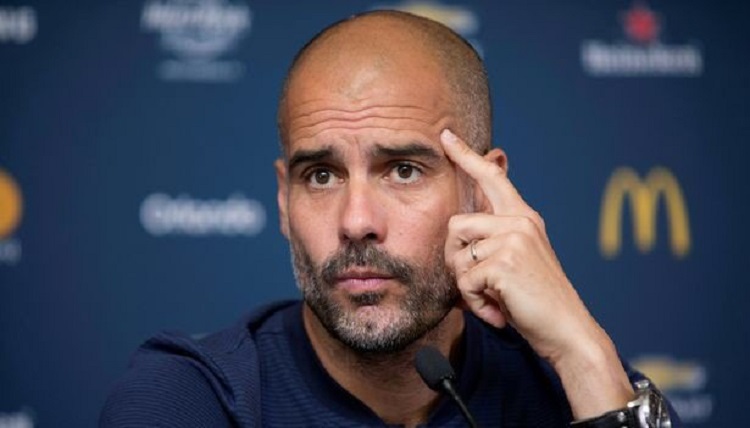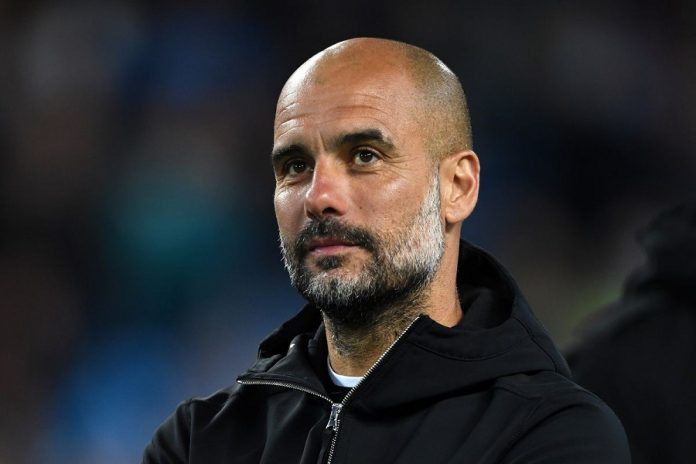Pep Joseph Guardiola is the son of a bricklayer from the pastoral city of Santpedor Catalonia. To all who don’t know the Che Guevera of Football, Guardiola is a former Spanish footballer and current Manager. He was regarded as one of the best footballers and midfielders in the entire world in his playing days, the early 1990s, as an association with his childhood club Barcelona turned out to be extremely successful.
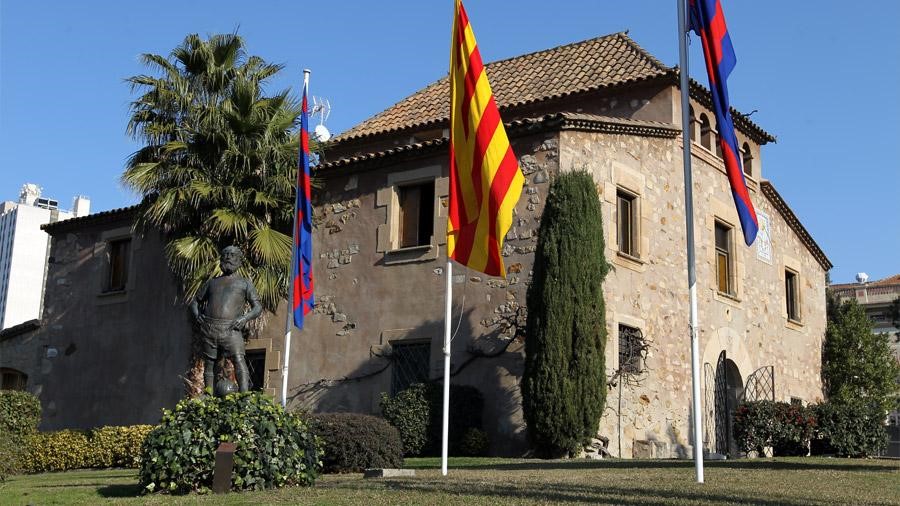

But this story you’re about to read isn’t about Guardiola “the person himself”, this is the story of how the Guardiola philosophy took over the footballing world. How he transformed clubs, leagues and countries into achieving success in a matter of just a few years. To be honest, there are many people who become coaches because they play football. But Guardiola became a coach because he was prepared like no other, because he observed and learned from everything he came across in life. Guardiola’s philosophy to begin with was easy – outscore the opponents, if they score 3 you score 4. Increase the speed and pass the ball while keeping the ball for as long as you can. The more you keep the ball, the more opportunities you’ll get to score.
All a football manager has on his mind is winning as it was with Guardiola. Guardiola, over the years has been unofficially anointed the ‘all knowing’ football coach. His source of happiness depends on success, all he wanted was to win, he coaches to win, not to entertain not to facilitate tactical innovations as he molds his squad as he wants into a winning machine.
A secret laid out in the open is that Guardiola’s philosophy of the game came from Johan Cruyff. Guardiola built on it, expanded on it and took it to its logical conclusion and maybe to the radical extreme.
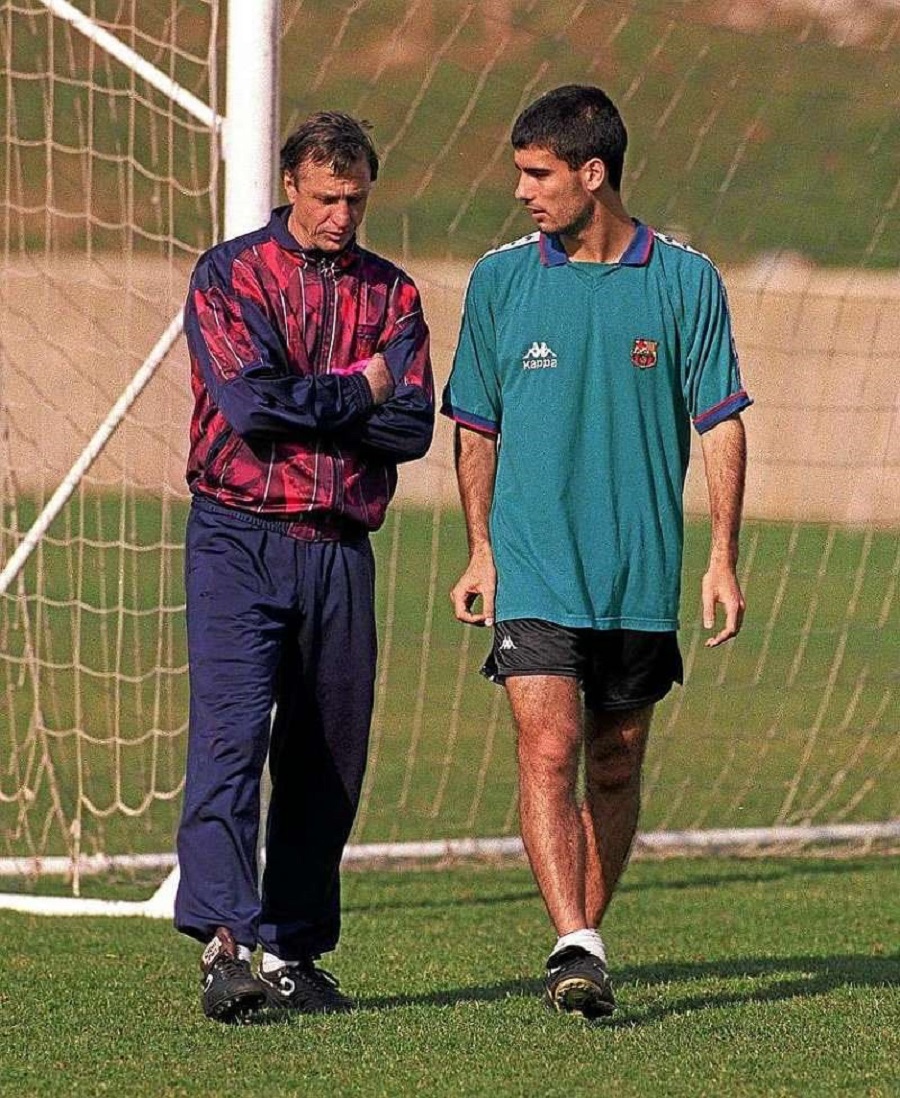
The Dutch legend was his biggest idol and mentor, who he had nothing but respect for, learning from his coach’s every move from the moment the Dutchman handed Guardiola his Barcelona debut back in the day. Guardiola became increasingly infatuated with the Dutchman’s absolute preparation for a match on and off the field of play.
“Guardiola wants to make football better” – Johan Cruyff
The first footnote of the managerial career of Guardiola happens at his Catalonian home of Barcelona as the manager and administrator of the Barcelona B team who were being relegated into the 3rd division which the Barcelona management weren’t pleased with. Taking over the malfunctioning team, Guardiola turned the tables, defying odds in a season; the B team as champions recorded an unbeaten season. The Catalonian people at the time had a lot to say courtesy of the Barcelona senior team being on the spiral down.
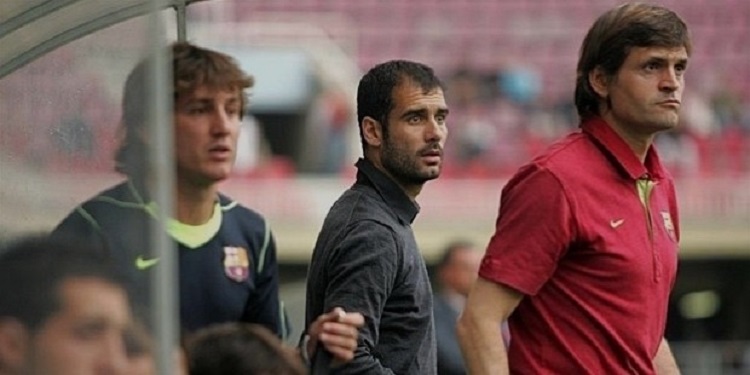
Guardiola immediately takes the reins, changes the philosophy and inculcates his own Tika-Taka philosophy into the system of Barcelona, taking out the rotten eggs, building the team around his main mid-fielders. However, the start isn’t of what they hoped for, the tika-taka fails to reap rewards in the first few weeks. Defeats on 31st August 2008 vs Numancic and a draw in the following week (1-1) starts raising questions of Guardiola’s tactics.
Two days later Cryuff writes an article “fans must be patient results will come. Barca have never played this spectacularly.” From that day forward, Barca fails to lose till December, and hence Guardiola’s first season starts off with a revolution and the legendary BARCELONA legacy starts off.
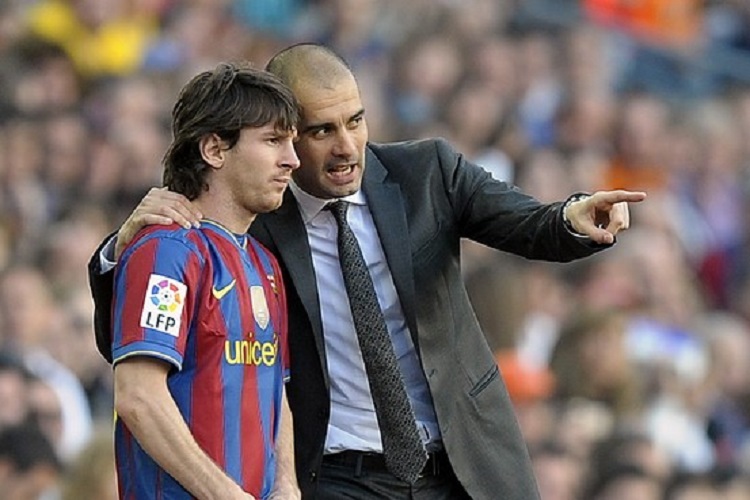

However, surprisingly he allowed the players to do so, shoving his philosophy under his arms. The result wasn’t pretty, Bayern went out of Champions-League playing the way the players wanted. Bayern lost a real chance of Champion’s League glory and hence he got everyone to follow his philosophy after the loss, winning trophy after trophy in Germany and elsewhere.
Guardiola due to his success, day in and day out, was constantly and always under the magnifying glass. There was also this perception of that he had joined one of the clubs that had a guarantee of winning a title, a local title, he was criticized of how he never won the champions league during his tenure at Bayern. Although he had the Bundesliga, the UEFA Super Cup, the DB Porkal and the Club World Cup, he was being judged by his Champion’s League glory unlike the other managers. However, to this date his three Bundesliga titles, two DFB-Pokal and a Club World Cup however, stand Guardiola up against the greatest of Bayern coaches.
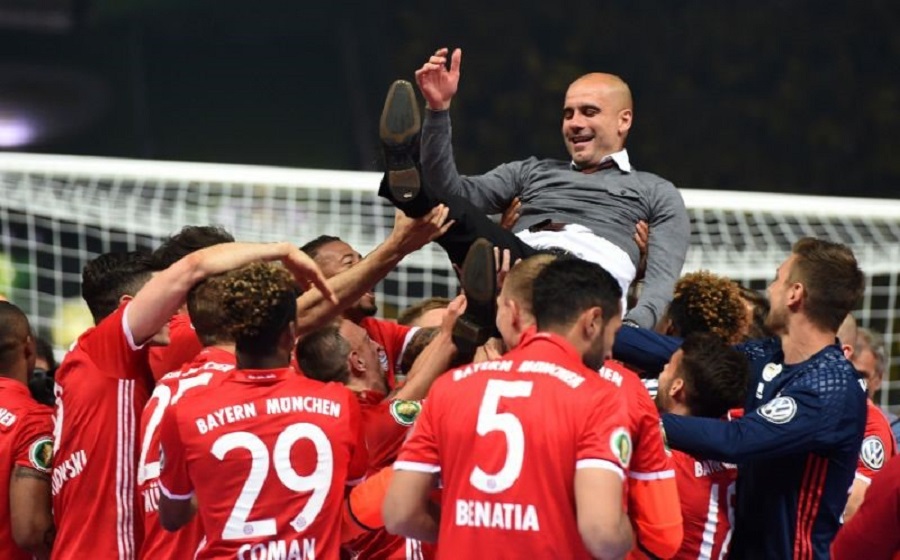
“He can play any system and change that in seconds.”
However, Guardiola is also someone who likes challenges, and with the turn of winning all trophies with Bayern Munich, Guardiola decided that his time in Germany was done and found his way from Bayern Munich to Manchester City in 2015/16.
The media which go crazy starts banter “Pep arrives in England – He won’t be getting candy here as he did in Spain and Germany”.
“Pep Guardiola might have arrived in England in the summer of 2016 with three Spanish and three German titles to his name, but those honors seemed to come with an asterisk. He had always managed footballing giants: Barcelona and Bayern Munich. He had triumphed only in leagues that looked like one- or two-horse or even maybe none.” – The New York Times
Guardiola trying to succeed at Manchester City would be a more challenging proposition, he was told. There will be no smooth sailing in the professed most competitive league in the world.
Roberto Mancini, knew it: “As coach of Barcelona, he had Messi, Iniesta, a phenomenal team. Then he went to Germany, where Bayern always wins, and therefore he did not have a difficult life.”
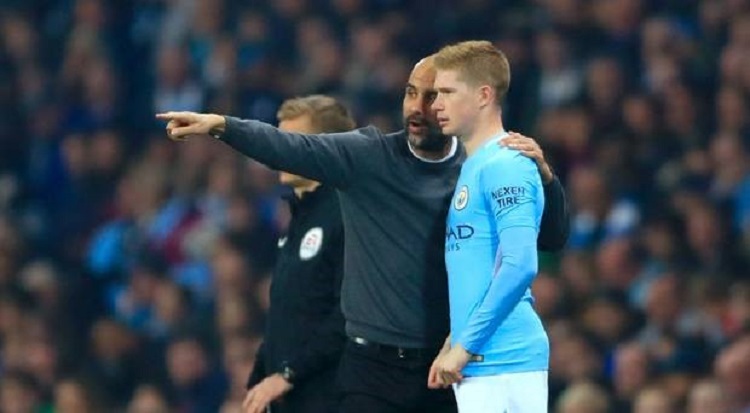
The excellence of his sides distorted the image of all the others. The quality of the two sides made the other teams look ordinary. The style and philosophy made others non-existence. It was all hard work, philosophy and grit.
In Spain, keeping the ball is so important, in Germany it’s the physicality and the counter-attack that is a weapon, and in England, the ball travels from box to box over the top to the second ball, the whoosh and whoosh as Pep himself says. The constant long balls in English football is another aspect that can be nurtured.
The “Zonal theory”, as people call it, of Guardiola took time to find its way into Manchester City, but it finally did. Manchester City did not only entertain, leave English football in awe, but Guardiola also managed to dominate all of England like none have done before.

- Biggest title-winning margin: 19 points
- Earliest to a title success in a season.
- Most points: City became the first team in English top-flight history to reach 100.
- Most goals: 106
- Most wins: 32
- Most consecutive wins: 18 matches.
- Most away wins: 16th win
- Best goal difference: +79
- Highest average possession: 71 %
- Most passes: 28,242 passes
- Most consecutive Premier League Manager of the Month awards: 4 Pep Guardiola
Soon after the miserably failing English national football team out of the blue come to life. The team that normally gets knocked-out in the group stages makes England believe that “IT’S COMING HOME”.
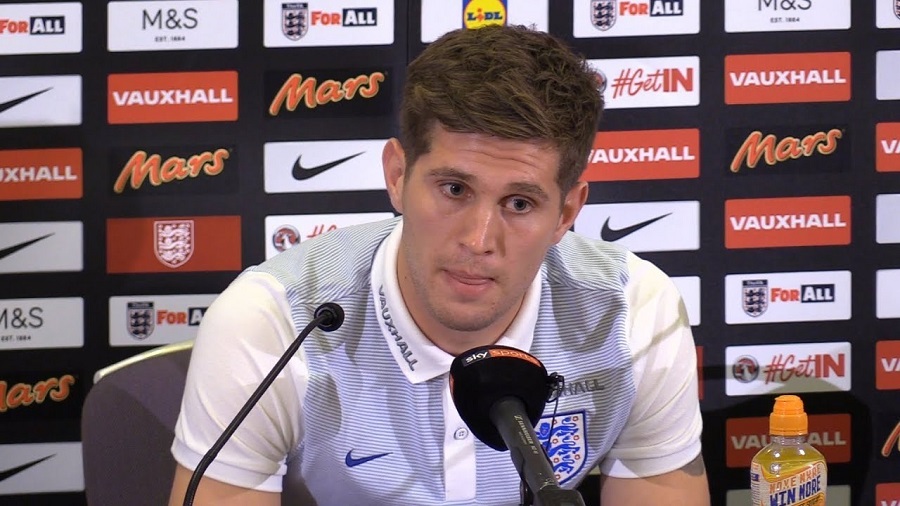
And ironically Manchester City had the capability of picking up a City 11 at the quarter finals in the World cup. The 4 City Englishmen played like they’ve played all season, John Stones the young defender molded by Guardiola becomes the star in defense.
Fact – Guardiola has improved footballers, not footballers who are really young, but footballers like Kyle Walker, Fernandinho and even Kevin de Bruyne.
“I think unquestionably Guardiola will influence the style of football in this country, not only is it pleasing on the eye, but its bringing success. I think Guardiola is great for the English game. So many people said he couldn’t play his style of football in the Premier League. I’m glad he’s stuck with his principles that his style of football came through.
He has not only proved you can win with it, it’s so beautiful to watch at times. We’ll always be grateful in the Premier League and English football because we all know that success is copied and imitated by other teams, other coaches and children playing the game.” – Gary Lineker
Football Philosophy changes follow Guardiola, changing world football, taking the leagues by surprise. England ended up 4th in the World-Cup and this has been the best they’ve played in decades.
Pep Josep Guardiola has already gone into the history books as one of the very best! He will never be forgotten by the countries and the clubs where he’s left his philosophy. The icon of Catalonia isn’t done yet, he hasn’t even thought of being done yet. He has nothing to prove, he’s done it all, he’s won every trophy.
